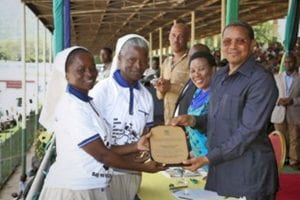 “The Sisters are women who stand up for women’s and girls’ rights.” – Mary, 15-year-old graduate of the December Rescue Camp, Tanzania, East Africa.1
“The Sisters are women who stand up for women’s and girls’ rights.” – Mary, 15-year-old graduate of the December Rescue Camp, Tanzania, East Africa.1
Last week we invited you to reflect on how charity should be an essential part of transformative action and the vital relational and affective dimension of justice. This week we’ll explore this theme through the example of an initiative of the Daughters of Charity in Tanzania focused on eradicating the practice of female genital mutilation. The Daughters’ unique approach combines ministering to those impacted by this practice, intently listening to their stories, and purposefully integrating their work with signs of the times to advance systemic change.
The Association for the Termination of Female Genital Mutilation (ATFGM) is an organization founded by The Daughters of Charity in Tanzania in 2008. It was created at the request of the local bishop, parents, and girls in the community seeking protection from this practice. The ATFGM runs a “December Rescue Camp” which affords a safe space for girls seeking to escape the practice. And, while such protection meets an immediate critical need, the focus of the camp is equally devoted to education and awareness. During the last decade, more than 2,500 girls have attended.
The Daughters also understand that in moving towards eradicating female genital mutilation, they must take into consideration multidimensional realities such as tradition, social stigma, and the economic implication for practitioners. Thus, beyond ministering directly to the girls, the Daughters work with parents, elders, schools, communities, and practitioners. They also target boys who will become future husbands and fathers. Additionally, they help former practitioners attend a government college to learn entrepreneurship skills, and eventually find work when they have graduated.
The work of the Daughters in Tanzania reminds us once again that the Vincentian approach to justice necessitates addressing immediate need while working toward broader systemic change.
As we think of the work of these Vincentian family members, what resonates with you about their approach? What challenges you? What can we learn from their approach that may inspire our work at DePaul today?
1) Meghan J. Clark, “Charity, Justice, and Development in Practice: A Case Study of the Daughters of Charity in East Africa,” Journal of Moral Theology 9:2 (2020), 11; at: https://jmt.scholasticahq.com/article/13334-charity-justice-and-development-in-practice-a-case-study-of-the-daughters-of-charity-in-east-africa
Reflection by: Siobhan O’Donoghue, Faculty and Staff Engagement Director, Mission & Ministry